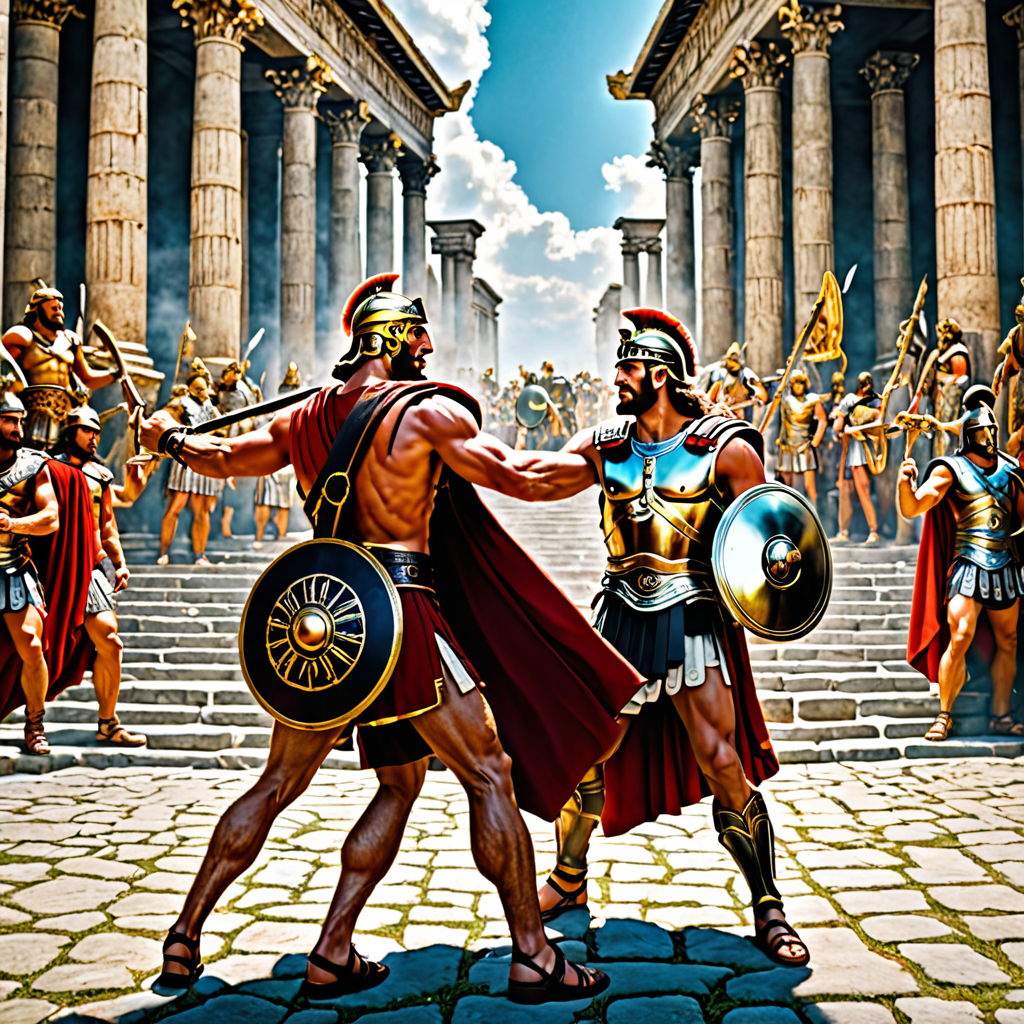The Cost of Disobedience: Legendary Divine Punishments Revealed
Introduction: The Concept of Divine Punishment
Divine punishment is a concept that spans various cultures and religions, often serving as a mechanism to enforce moral behavior and adherence to divine laws. Defined broadly, it refers to the consequences meted out by a higher power in response to human disobedience or transgressions. Throughout history, these punishments have been interpreted as both literal and metaphorical, reflecting society’s understanding of justice and morality.
In many ancient civilizations, disobedience to divine authority not only warranted punishment but also provided cautionary tales about the importance of obedience. These narratives served to reinforce societal norms, emphasizing that straying from the path of righteousness could lead to dire consequences.
Ancient Myths and Their Lessons
Ancient myths often encapsulate the essence of divine punishment through allegorical stories that convey moral lessons. These tales highlight the catastrophic results of defying the gods and the importance of living in accordance with divine will.
- Prometheus: In Greek mythology, Prometheus defied Zeus by stealing fire from the heavens and giving it to humanity. As punishment, he was condemned to eternal torment, with an eagle eating his liver daily, showcasing the notion that even acts of benevolence can lead to severe consequences if they defy divine order.
- Pandora: The story of Pandora emphasizes the dangers of curiosity and disobedience. When Pandora opened a jar (often mistranslated as a box), she released all the evils into the world, leaving only hope inside. This myth serves as a warning against disobedience and the unforeseen repercussions that can arise from it.
- The Tower of Babel: In this biblical story, humanity’s ambition to build a tower reaching the heavens led to divine intervention. God confused their languages and scattered them across the earth, illustrating the punishment for collective disobedience and the folly of human pride.
Biblical Examples of Divine Punishment
The Bible is replete with stories that underscore the theme of divine punishment as a response to human disobedience. These narratives often serve as moral lessons for believers.
- The story of Adam and Eve: The original sin in the Garden of Eden exemplifies the consequences of disobedience to God’s command. Their act of eating from the Tree of Knowledge resulted in expulsion from paradise and the introduction of sin into the world.
- The Great Flood: In the account of Noah’s Ark, humanity’s moral decay prompted God to flood the earth as a form of divine punishment. Noah and his family were spared, symbolizing hope and redemption amid widespread disobedience.
- Sodom and Gomorrah: The cities of Sodom and Gomorrah were destroyed due to their inhabitants’ moral decay and disobedience to divine laws. This story serves as a stark reminder of the consequences of a life devoid of righteousness.
Cultural Interpretations of Divine Retribution
Different cultures have their own interpretations of divine punishment, often reflecting their unique values and beliefs.
- Greek mythology: The Greeks often viewed divine punishment as a form of justice administered by the gods, emphasizing the importance of hubris and the balance of fate.
- Norse mythology: The Norse gods also imposed punishments, often associated with themes of fate and retribution, as seen in the tales of Loki and his eventual punishment for his misdeeds.
- Hindu mythology: In Hinduism, the concept of karma illustrates how actions have consequences, serving as a form of divine retribution that affects individuals across lifetimes.
Historical Events Seen as Divine Punishments
Throughout history, many disasters and calamities have been interpreted as divine retribution for humanity’s collective sins.
- The Black Death: This devastating pandemic in the 14th century was often viewed as a punishment from God for the moral failings of society.
- Natural disasters: Earthquakes, floods, and other disasters have frequently been attributed to divine punishment, with communities turning to their faith in search of explanations and solace.
- Wars: Many wars have been seen as divine retribution for human arrogance or disobedience, with leaders invoking divine will to justify their actions.
Modern Perspectives on Disobedience and Punishment
In contemporary society, beliefs surrounding divine punishment have evolved, often influenced by new philosophical and theological perspectives.
- Contemporary belief systems: Many modern interpretations of ancient texts focus on the underlying moral lessons rather than literal divine punishment, emphasizing personal responsibility and ethical living.
- Case studies: Scholars and theologians analyze modern-day events through the lens of historical texts, exploring how ancient narratives continue to resonate today.
Psychological and Sociological Impacts of Belief in Divine Punishment
The belief in divine punishment plays a significant role in shaping individual and societal behavior.
- Fear and morality: The fear of divine retribution can encourage moral behavior, leading individuals to adhere to societal norms and laws.
- Influence on societal norms: Communities often establish laws and ethical standards influenced by the belief in divine punishment, creating a framework for acceptable behavior.
The Role of Literature and Art in Depicting Divine Punishments
Literature and art have long explored themes of disobedience and divine punishment, serving as a reflection of cultural beliefs and moral lessons.
- Literary works: From Dante’s “Inferno” to Milton’s “Paradise Lost,” literature often grapples with the complexities of sin, punishment, and redemption.
- Artistic representations: Painters and sculptors have depicted divine retribution in their works, capturing the emotional and moral weight of these stories through visual means.
- Film: Modern cinema frequently revisits these themes, illustrating the enduring relevance of divine punishment in contemporary narratives.
Lessons from Legendary Punishments: Morality and Ethics
Analyzing historical and mythological punishments reveals valuable lessons about morality and ethics.
- Importance of obedience: These stories underscore the value of adhering to moral principles and the potential consequences of transgression.
- Implications for modern dilemmas: The moral lessons derived from these narratives can inform contemporary ethical debates and personal decision-making.
Conclusion: The Enduring Legacy of Divine Punishments
The concept of divine punishment remains a powerful narrative across cultures and epochs. By examining the stories and lessons of disobedience and its consequences, we gain insights into human behavior and societal values. These enduring tales continue to influence beliefs and inspire discussions about morality, ethics, and the human condition, reminding us of the profound impact of our choices and the importance of seeking harmony with divine and moral laws.



